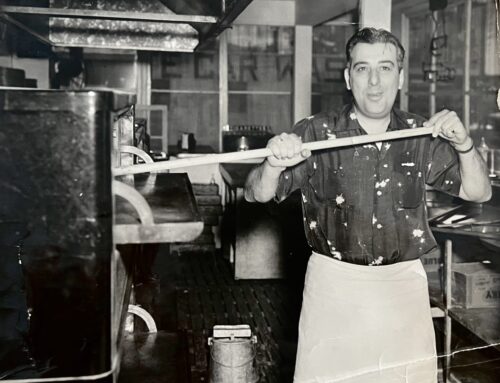“We have not given up our traditions and our culture just because we are witches or LGBTQ! We are proud Appalachians; we are proud witches.”
By Emma Cieslik (she/her)
Stephanie Starr Long, a practicing solitary witch of Melungeon descent, wakes up before 3 am every morning. In the quiet moonlight, she methodically fixes her favorite morning tea, lights honeysuckle incense, and says a prayer to her patron deity Bastet. “Thank you, Beloved daughter of Ra, for the blessings you bestow on all of us everyday.” She puts on her tourmaline and obsidian bracelet to protect against negative energy, which she cleanses every night, and loads a new bag of dried cat food into her car to feed any strays she meets along her way to and from work. Feeding these animals is an act of gratitude to Bastet, an Egyptian goddess of protection and good health with the head of a cat.
When she gets home, she lights more incense and lays a small object collected during the day–for example a feather or rock–on her altar as an offering. As she cooks dinner, she sometimes uses food coloring pens to write intentions on her ingredients, such as bay leaves, recalling kitchen witchcraft common among Appalachian folk magic practitioners. After cleaning up, she writes in her journal or Book of Shadows, which she hopes to pass onto her children one day, and jumps into the tub. Sometimes she adds herbs and flowers to the bath water while sending out positive intentions for tomorrow. She ends the day by thanking Bastet again for protecting her, her house, and her family.
Long’s story could take place anywhere in the United States–goddess worship is experiencing a revival along with eclectic witchcraft and paganism across the Americas and western Europe. But her rituals are closely tied to the Appalachian Mountains that she calls home, just like countless other Appalachian folk magic practitioners and witches who cast and create with the flora and fauna around them. In particular, queer Appalachians like Long, are finding spiritual homes within these traditions and among circles, covens, and support groups all along the Appalachian Trail. This is the story of the queer witches of Appalachia.
The Witches’ Church
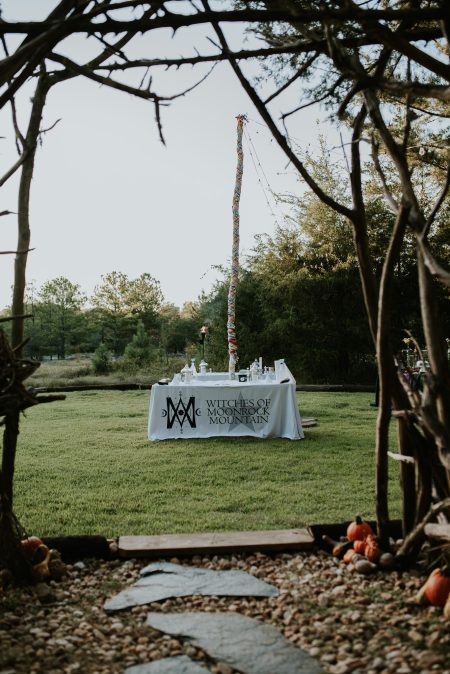
Born in Hancock County, in the town of Sneedville right on the Tennessee state line, Long was raised in the Southern Missionary Baptist Church like everyone else she knew growing up. This included her mamaw, who Long believes was a granny witch. While she knows that her grandmother would have whipped her silly for calling her such, Long remembers watching her mamaw talk fire from a burn, cure cradle cap, and use home remedies to heal ear arches. Home doctoring was and is common among isolated parts of the mountains, where granny witches incorporate spell work and ritual healing into their existing Christian beliefs and worship.
Today, a number of Appalachian folk magic practitioners still identify as Christian, or as Christian witches, to recognize their religious and cultural roots and also to avoid stigma in deeply Christian communities. In researching queer covens and folk magic circles, many people noted how church is a metaphor for spiritual meaning and community they find in their craft.
Some of Long’s fondest memories with her grandmother involved hunting for mushrooms and roots together in the woods. Ever since she turned 17 and moved to middle Tennessee, she continued her grandmother’s tradition and began practicing witchcraft. Long never felt comfortable in a Christian church, partially because she is bisexual and Baptist churches have long histories of psychological and physical harm and violence against LGBTQ+ individuals. But in her hometown, “it didn’t really matter what church you belonged to as long as you belonged to some church.” In isolated mountain communities, churches provided local support networks and hosted community discussions, often a space denied to LGBTQ+ folks.
Long was not alone. Jake “Dr. Buck” Richards, author of Appalachian Folk Healing: A collection of Old-Time Remedies, Charms, and Spells and Backwoods Witchcraft: Conjure & Folk Magic from Appalachia, also felt the pressure to be part of his family’s church. Born and raised in upper East Tennessee, none of his family identified as a witch aside from his Papaw Oscar who was a water witch. His family has been rooted to the land for at least 300 years. Although his papaw was a Freewill Baptist preacher at his church and he never targeted LGBTQ+ folks on the pulpit, Richards vividly remembers guest preachers spreading hate speech. “The God spoken of at home,” Richards admits, “was a different character altogether.” But those experiences in church were traumatic, and up until he came out at 13, he had spent years trying to strengthen his Christian faith to make himself better.
He shared his identity after scriptural research, finding that his tears and prayers were spent trying to model his relationship with Jesus to mimic that of everyone else’s that he saw, just like Long. Witchcraft provided a space for him that he felt did not exist in the world, cementing his practice in the people, objects, and nature surrounding him.
“The church had little me thinking God was out there and up there. Distant. So distant it felt like you had to take a number and wait. But I learned, through folk magic and my ancestors, that He is with me, in every action, every breath, everywhere. It also led me to learn more about Christ than the church would have ever taught me. Likewise, my work has incidentally led people back to the God of their ancestors. That wasn’t my plan. I just wanted to lead them back to the magic of their home. And it turns out they made it back to a home they also felt excluded from, straight or queer.”
It was in witchcraft that he found a magical queer church through which he found a community, with both his ancestors and other witches, that welcomed all of him.
Long found her own version of queer church in the Appalachian Mountains–the Pagans of Warren County–where her identity is celebrated and affirmed. “I’m not sure that being bi actually affects my path,” she explained, “but my path makes being bi easier in ways. There’s no condemnation from fellow witches. There’s no religious ‘rules’ that state I’m going to hell. There’s a freedom in witchcraft to be your authentic self no matter race, creed, or sexuality.” Despite leaving the Christian Church, she feels her ancestors’ hands on her shoulders as she practices a uniquely Appalachian and queer witchcraft. As she firmly believes, they are proud of the woman that she has become and the knowledge she will pass onto her children.
Similarly, bisexual witch, mother, and librarian Annie Colson finds a feeling of church in the flora and fauna of the Appalachian Mountains. Although born with Appalachian blood, Colson was adopted into a family in Arizona. Raised by a Christian deacon, she discovered paganism as a form of rebellion against her parents. Soon after, she met the owners of The Astrology Store in Glendale, Arizona. The incredibly affirming and welcoming gay couple behind the counter meant the world to a young Colson, and the first person she came out to was co-owner Ray Watkins who welcomed her with open arms. She officially “came out of the broom closet” at age 16 at the same time she better understood her sexuality.
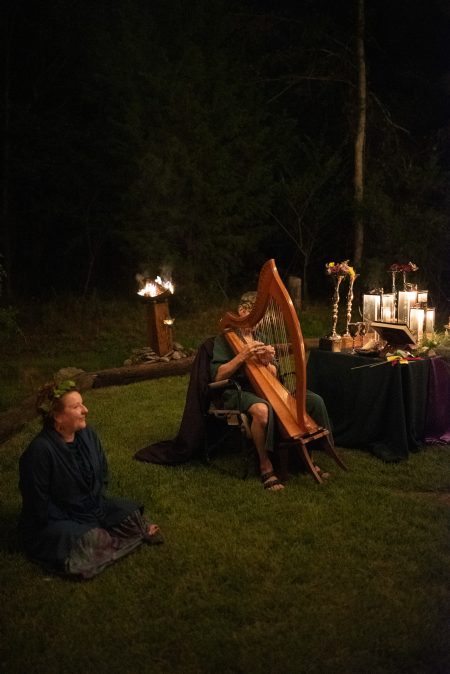
“It was in paganism,” Colson elaborates, “that I first found acceptance for ALL of me, not just the parts that were easy to love, and in the community, I run, that’s something that I cherish, and it’s a way to keep Ray’s memory alive.” As an adult, Colson moved back to McMinnville, Tennessee where she found a church of her own. Colson spends her weekends barefoot in her fenced garden, where she grows corn, melons, and summer squash. She plants an abundance believing it her job to provide stewardship to the planet she calls home, and the Earth she calls church. She intentionally leaves space at the bottom of the fence for rabbits and other animals to pop through and help themselves, regularly picks up garbage while hiking, and urges others not to litter. “The Earth is my church because it’s where I feel most at peace, where my soul rests, and where I can choose to remember or forget as needed.” Colson’s queer church is the land that surrounds her, the Appalachian Mountains in her backyard that provided the plants for her ancestors’ possible herbal remedies.
Networks of Support
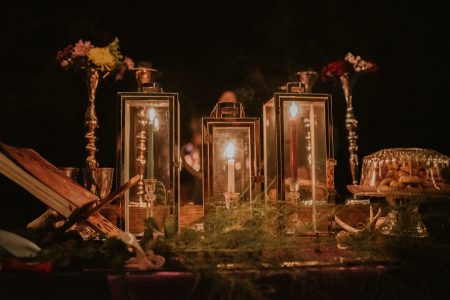
In a region where almost everyone is part of a church, as Long described above, covens, circles, and support groups provide witches within isolated communities and scattered across the Mountains with spiritual homes. While many groups openly welcome witches of any gender, sexual orientation, race, or creed, they also intentionally meet in safe spaces in the community and ask members to wear name tags (including personal pronouns) at each meeting. For example, Morgana Morrigan, Head Priestess for Coven 92 in Woodstock, Georgia, shared that her circle–which includes a number of LGBTQ+ members–meets at a designated safe space. They meet in a member’s salon known in the area for genderless haircuts and inclusive staff.
“I think what really affirms that we are safe,” Morrigan said, “is our energy and compassion towards each person who comes to check us out. We have a great mix of all different practices, ages, sexual identities, and backgrounds. We understand we are different, but are compassionate enough to still coexist together in a beautiful way.” The coven gathers once a month to host classes, craft sessions, rituals, and meet and greets. Usually around 20-30 people show up, although more people participate in the yearly Samhain and Yule Potlucks held at members’ homes. This year, Coven 92 hosted two astrology classes, made their own incense, painted hex signs, and practiced wax painting, met with a dream intuitive, made and danced the maypole, and hosted several rituals for members in need.
The mission of supporting members in need closely recalls churches in Appalachian communities. For LGBTQ+ individuals, where churches recall histories of harm, trauma, and violence and are socially excluded Appalachian covens and due to queerphobia, support groups like Morrigan’s, and the Pagans of Warren County step up to care for their own. The Pagans of Warren County, led by Colson over the past year, developed an outreach program to help members in times of economic and personal stress, such as surgeries, loss, and new family additions. One part of this program is a meal train. The pilot will start on September 20th and provide five days of hot meals to Colson’s coadmin who is having knee placement surgery.
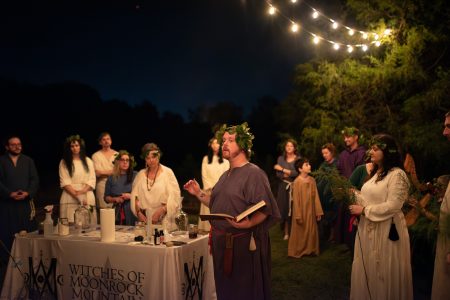
By creating programs that provide for their members, covens, circles, and support groups acknowledge the unique stresses and challenges of being LGBTQ+ in Appalachia despite LGBTQ+ people existing in the region for decades. In fact, LGBTQ+ individuals are stepping into leadership roles in some covens like the Witches of Moonrock Mountain in Georgia, disrupting decades long traditions of straight leaders. Lord Lucian, High Priest of the Witches, explains that he, along with half of their group, identify as gay or lesbian. His group was originally initiated by family tradition, wherein straight family members led the tradition generation after generation. Lucian is the first one in his line to be gay and head a coven.
Just like Coven 92, “someone’s sexuality doesn’t play into our acceptance process,” Lucian notes, “neither does their gender, gender identity, age, skin color, or religious background. What we look for is sincere interest and belief.” In fact, the rise of LGBTQ+ leaders in covens, circles, and support groups like Lucian and Colson speaks to growing numbers of Appalachian witches acknowledging their gender identities and sexual orientations and claiming their mountain roots as key aspects of their own practice, as key parts of what make them a witch in the first place. Lucian, Colson, and Richards also represent growing numbers of LGBTQ+ Appalachian witches leading their communities in inclusive practice and outreach.
Finding the queer witches

LGBTQ+ Appalachian witches, Long explains, are rare finds. For Long, this was mostly the result of Appalachian culture and a deeply Christian tradition keeping people in both types of closets. But as Richards explained, this does not erase the fact that queer people have existed in Appalachia for centuries, and in queer witches. “Love has always been fighting in these mountains.” The forces that kept and keeps people from coming out as LGBTQ+ and from practicing their witchcraft and folk magic freely and openly make finding community difficult, as Long found out, but new social media platforms like Facebook are connecting folks in isolated mountainous regions across the Eastern United States and raising awareness about existing groups in the region, such as Coven 92 and the Pagans of Warren County.
When asked about how this research will increase representation, she explained: “what I would like people to know is simple. We exist! We are out here. We have NOT given up our love of our mountain upbringing, we have not given up our traditions and our culture just because we are witches or LGBTQ! We are proud Appalachians; we are proud witches. We’ve always been here, we’ll always be here, and we’ll continue to pass down our knowledge and our love of the mountains, our love of folk magic, to the next generation to come.” Beyond new digital platforms, Colson, Lucian, and Richards roles as leaders in the Appalachian witch community increase representation of queer Appalachian witches and inspire others to join groups.
For example, I met Camille Rivera, a queer witch whose family has lived in the Kentucky Appalachian Mountains for generations, through the Appalachian Traditional Witches: Hedge Witches, Old Craft, Folk Magic Facebook group. Rivera explained the importance of openly identifying as Appalachian as well as LGBTQ+, fighting histories of classicism inside the witch community and the region and destabilizing Appalachia as a stereotypically straight place.
Rivera was born and raised in the Appalachian region, as were her parents, and their parents before them. Her mother is from Lewis County, Kentucky, and her dad is from Carter County, Kentucky, met and married in Rowan County where Rivera was raised. Like other Appalachian families, the terms “witch” and “witchcraft” were taboo and her family went to the non-denominational Wallingford Community Church in Kentucky. Inside the church, many people practiced folk magic, including her grandmother who used local plants in herbal healing and was clairvoyant and her mother who inherited the same abilities. As discussed frequently in the family, her grandmother used a tea mixture to cure her mother’s scarlet fever, and Rivera’s own mother healed her colic with catnip tea.
Her mother’s clairvoyance was also striking, receiving premonitions as clear as day, and while Rivera has experienced several, she believes her abilities will develop further with time. All of her family members who possess the ability in her family lose their sight as this power develops, she explained. She is grateful that her family was supportive when she came out three years ago, offering nothing but love and understanding. She is also not the only queer Appalachian witch, she counts one of her cousins as well, and while she currently lives in Columbus, Ohio for work, she plans to move back to Martinsville, Virginia where her mom lives to be back in the Appalachian Mountains.
In her experiences, coming out as LGBTQ+ and coming out of the broom closet went hand in hand for her. “I think that once you’ve broken that barrier of being LGBTQ and you’ve acknowledged that there’s something different about you in a rural area where some people can be really resistant to anything different, it’s not that much harder to openly acknowledge your witchcraft and to not be afraid to call it what it is.” Just like Long, Rivera explained that being an LGBTQ+ Appalachian witch is about being true to herself and her ancestors, acknowledging and upholding practices that have been passed down through her family for generations. This is a slow and steady movement as people find the courage to acknowledge their multifaceted identities and how they coexist with their Appalachian heritage.
“I think, in a way, a lot of us are conditioned to be ashamed of being a ‘hillbilly.’” Rivera said. “Whether by outsiders or by our own families, I think some of us develop internalized shame and stigma around being poor, having an accent, coming from a rural area with not a lot of access to important healthcare and so on. I think it’s a positive thing that more and more people are openly embracing themselves and shedding the shame.” To be a queer Appalachian witch is to dismantle the classist, sexist, and religious systems of oppression that exist locally and nationally, as well as classicism that exists within the witchcraft community itself. To be a queer Appalachian is to challenge family and group gatekeeping of magical knowledge.
Witchcraft has for centuries been a spiritual refuge for LGBTQ+ abandoned, oppressed, and harmed by Christian churches, especially in Appalachian regions, and with more LGBTQ+ Appalachian people taking on leadership roles, the queer part of Appalachian folk magic is becoming more apparent and celebrated. In doing so, the queer Appalachian witches of today are sustaining their legacies by making their covens, circles, and support groups welcoming environments for the next generation. As Richards poetically said, “Just as in everything else, every queer Appalachian person is an answered prayer of one of their ancestors.”
All photographs are courtesy of Lord Lucian, a queer high priest of the Witches of Moonrock Mountain, and depict their Mabon celebration on Saturday, September 23, 2023.
This article is dedicated to all LGBTQ+ witches around the United States who are persecuted, abused, or killed because of their identities, including Colson’s mentor Ray Watkins who was killed outside his shop in 2020.
Emma Cieslik (she/her) is a queer museum professional and religious scholar researching the intersections between gender, sexuality, material culture, and religion.



